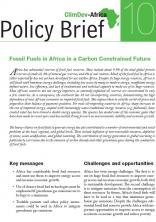Policy Brief 10 : Fossil Fuels in Africa in a Carbon Constrained Future

Africa has substantial reserves of fossil fuel resources. These include about 9.5% of the total global proven reserves of crude oil, 8% of natural gas reserves, and 4% of coal reserves. Much of the fossil fuel in Africa is either exported or has not yet been developed for use within Africa. Despite its huge energy resources, Africa is still faced with enormous energy challenges, including low access by many to modern energy, insufficient energy infrastructure, low efficiency, and lack of institutional and technical capacity to make use of its huge resources. Most African countries are net energy importers, as currently exploited oil reserves are concentrated in only a few countries. As a consequence, the continent has 38 net oil-importing countries, demonstrating the high dependence of most African economies on imported fossil fuels. This exposes them to volatile world oil prices and jeopardises their balance of payments positions. For most oil-importing countries in Africa, sharp increases in
the cost of imported energy, coupled with increasingly scarce traditional energy resources (e.g. fuelwood), have created what has been termed a double energy squeeze. The squeeze has eroded some of the economic gains that have been made in recent years and has exerted strong pressure on macroeconomic stability and economic growth. The heavy reliance on fossil fuels to generate energy has also contributed to a number of environmental and social problems at the local, regional, and global levels. These include depletion of non-renewable resources, depletion of ozone, ocean acidification, and global warming. The contribution of energy generation to global warming is particularly worrisome due to the emission of carbon dioxide and other greenhouse gases during the combustion of fossil fuels.